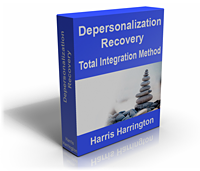Harris Harrington shows you how to increase your attention and decrease your DP.
By Harris Harrington
In Depersonalization Disorder, attention and short term memory are often among the most impaired cognitive faculties. This correlates with distractibility, fogginess, deja vu, jamais vu, derealization, and a host of dissociative symptoms. Attention on the one hand and distraction on the other can be thought of as two ends on a focus spectrum. In order to mend distractibility, and a tendency towards spaciness, it is important to practice attention exercises. Dan Siegel, a UCLA psychiatrist and founding father of Interpersonal Neurobiology has pointed out that attentional activities such as sustained reading require coordinated mental functioning of many different brain regions. By frequently engaging in sustained reading, one can heal many mental problems that would be seemingly unrelated to attention. It turns out that sustained reading is a very integrative and therapeutic activity for the brain in general, and was something that greatly helped me recover from Depersonalization Disorder, among many other things of course.
Deep states of attention and even meditation have been linked to gamma brain waves. Some researchers speculate that this brain wave form is central to neural consciousness. Whether or not this is true, attention and meditation exercises are extremely important in integrating the brain, and eliminating DP.
It makes sense that people with Depersonalization feel they have lost a piece of themselves, since attention is a key component of consciousness. Where we put our focus largely determines our mood, and a lack of focus can derail our conscious experience of life and ability to reach our goals. Conversely, by using our focus more often, and strengthening it like a muscle, we stimulate the neurons related to attention and short term memory, which are impaired in most people with Depersonalization.
Multi Tasking has been found to be very unhealthy for the brain. The opposite of this is single tasking, which is where we engage in one activity for a sustained period.
I am going to recommend two exercises for you, to help get you started with strengthening your attention, which will go a long way in helping you get over your dissociative tendencies and symptoms of Depersonalization.
Exercise 1: Sustained Reading
Take a book, especially something dense and technical, and take it into a noisy environment like a cafe. Start anywhere and try as best as possible to stay totally focused on what you are reading. Speed is not the goal, but rather complete comprehension. Read slowly and take in all the meaning fully. If sounds or images in your peripheral vision distract you, bring your attention back to the page, ignoring the potential distractions around you.
One of the most important aspects of attention is the deletion of unimportant stimuli. Human beings are “deletion creatures”. We only pay attention to what our brain determines as important or significant. This has become known as the “reticular activating system” in popular psychology, named after a part of the brain located in the brain stem related to attention and mental filtering.
Sustained reading can also of course be done in the comfort of your home without distractions, and with prose or whatever reading material you like most. Novels and engaging plotlines not only engage your sustained focus and attention, but they also help stimulate different parts of your brain that represent the various sensory information in your mind. A great story incorporates and weaves together metaphors, sensory information, conflict, resolution, characters, and complex relationships. In order to process these events in your mind, you are stimulating many different parts of the brain. I talk about narratives in my program quite a bit. Reading narratives, and constructing a narrative of your own life are things I go over in length. But for this exercise, just focus on paying sustained attention to a piece of reading material, taking in all the information with full comprehension and reducing distractions as much as possible.
Exercise 2: Meditation
Meditation is a millenia-old practice, one of the oldest forms being yoga which comes from the ancient Sanskrit root meaning to “yoke the mind”. The word yoga essentially embodies a metaphor for controlling your mind like a wild horse or ox.
A depersonalized mind is certainly hard for most to tame. But with a little practice, even just 10 to 20 minutes a day, you can find it easier to bring clarity to your mind and allow the storm of depersonalized thoughts to evaporate.
Pick a point on the wall, or some specific object to focus on. You can be standing or sitting, or even lying on your back looking at the ceiling.
Keep your focus on this object for 10 minutes without averting your gaze. If thoughts or images pop up in your mind, accept them, don’t fight them, and allow them to dissipate. Don’t suppress any thought or urge that comes up, such as thinking about what you have to do tomorrow, or some stressful event you are anticipating. Allow them to arise in your mind. Unlike most pursuits, meditation is not about goal attainment, but rather the temporary relinquishing of goal directed thoughts and behaviors.
In meditation it is important to be in a metacognitive mental mode. In other words, you are detached from the thoughts and images that are drifting through your mind. You don’t “fuse” with your thoughts, or identify with what is in your mind, but rather you view thoughts and images as simply the content of your mind that you can observe from a detached, non-involved stance. In acceptance and commitment therapy this is known as cognitive defusion. The point of this detached mindfulness is not to suppress all thought processes, but simply to act as a passive observer that takes a mental note of whatever thoughts arise. It’s important to allow the thoughts to pass and not dwell on them. After a while your mind will become clearer.
If there are outside noises, don’t dwell on them. Allow your focus to remain on your object of choice. Be accepting of whatever emotional or bodily sensations you are experiencing, and don’t be harsh with yourself if you find it challenging to clear your mind. Be kind and patient with yourself.



